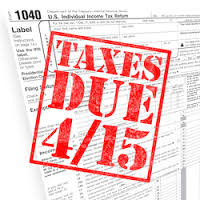Where Is My Tax Refund?
The IRS has announced that the recently opened 2016 tax season started off on a good note. In fact, they reported the receipt of thousands of tax returns on opening day with no major filing issues. It has also been reported that the average wait time for a tax professional to speak to an IRS representative is ten minutes in comparison to wait times of over an hour last year. Although it is still very early in the game, expectations are high for a smooth and easy tax season. This includes the issuing of tax refunds which is the aspect of tax filing that is usually of highest interest to taxpayers.
If you have filed your tax return and are anxiously awaiting your refund, you are well ahead of the game. This year, taxpayers actually have a few extra days to file their 2015 tax returns. The filing deadline has been moved ahead to Monday, April 18, 2016 (April 19, 2016 for taxpayers in in Maine and Massachusetts) due to the observation of the Washington D.C. Emancipation Day holiday on April 15th. That being said, once you or your tax preparer have filed your return, you can go to the IRS Refund app/tool on the IRS website https://www.irs.gov/Refunds to check the status of your refund. The IRS updates this site once per day, so there is no advantage to checking it constantly.
The “Where’s My Refund?” app/tool will guide you through the refund process in three easy steps:
1) Return Received – The site will let you know when your return has been officially been received by the IRS.
2) Return Approved – Most refunds are approved and sent via direct deposit unless you have requested a paper check. Once your return has been approved, the site will let you know when your refund is scheduled to arrive.
3) Refund Sent – Your refund is on its way. It usually takes about five days for direct deposits to arrive, whereas mailed refund checks can take weeks
The IRS predicts that most refunds will be issued in less than 21 days from the time the return is received. However, the process will take longer if there is a mistake, an inaccuracy, an omission of required information or the return is selected for further review. To avoid a delay in receiving your refund or even an audit, it is often best to use a professional tax preparer, especially if your return is complicated. If you have not received your refund within 21 days of e-filing (or six weeks of mailing your paper return), the “Where’s My Refund?” app/tool that will route you to direct contact with an IRS agent to get further information and assistance. Based on 2015 data which showed that the IRS processed over 109 million refunds, this streamlined refund process represents quite an accomplishment!
If you have tax questions or a tax debt you are unable to pay, our tax settlement professionals are happy to discuss your tax resolution options free of charge. For more information about our services, visit us today at www.professionaltaxresolution.com or call us at 877.889.6527. With over 16 years in the business of resolving tax debt, we have a thorough understanding of tax law together with the experience to know which settlement option will be the best fit for your specific set of circumstances.




